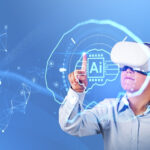In a fast-paced world today, staying ahead of the game often means adopting the latest technology. One such technology, rapidly gaining a foothold in all lines of business, is AI. AI is no longer a buzzword; it is the new technology that is transforming the way businesses work. It is empowering organizations to reach new heights of efficiency and innovation.
Now, let’s touch on five AI tools that are transforming industries globally:
Chatbots for Customer Service:
Gone are the days of long hours and redundant answering of similar queries of customers in customer care. AI-enabled chatbots have arrived, providing instant responses and personalized assistance to customers round the clock. These chatbots work under natural language processing algorithms that enable them to comprehend and respond to the queries of customers. Whether it is solving problems, recommending products, or guiding users through a purchase, chatbots provide a better customer experience while offloading human agents from the burden.
Predictive Analytics for Business Insights:
Predictive analytics work on AI and machine learning algorithms to analyze past data to predict future trends. By sifting through tons of data, businesses get the help they need to understand customers, markets, and business performance. These insights help businesses take data-driven decisions, optimize operations, and drive new opportunities for businesses. Whether it is predicting customer churn, optimizing supply chain logistics, or forecasting sales trends, predictive analytics has made strategic planning an altogether new ball game for businesses.
Computer Vision for Visual Recognition:
Computer vision powers machines to recognize and understand the visual world, opening up a lot of applications across various domains, from facial detection and object detection to image classification and quality inspection. Computer vision applications are not just the beginning; as computer vision progresses, AI is expected to push further boundaries.
Natural Language Processing (NLP):
Natural Language Processing is the domain of Artificial Intelligence that focuses on the interaction between humans and computers at a language level. By analyzing and understanding human language, NLP algorithms can lead to insights, sentiment, and context in vast amounts of text data. This technology powers a wide range of applications, from sentiment analysis and language translation to content generation and chatbots. NLP is used to analyze news articles and social media feeds for market sentiment analysis in the financial sector. It is changing the way we derive valuable insights from medical records and research papers in healthcare.
Reinforcement Learning for Autonomous Systems:
Reinforcement learning is a type of machine learning wherein AI agents learn to perform optimal actions through learning by doing. Reinforcement learning algorithms use trial and error to reward desirable actions and penalize the undesirable ones so that AI agents can perform even complex tasks automatically. This technology is driving autonomous driving, robotics, and game playing. In transportation, reinforcement learning is allowing self-driving cars to navigate safely through traffic and adapt to changing road conditions. In manufacturing, it’s optimizing production processes and reducing downtime through predictive maintenance. Reinforcement learning is paving the way for a future in which autonomous systems play a central role in virtually all industries.
Conclusion
AI tools are transforming industries by improving efficiency, accelerating innovation, and unlocking new possibilities for growth. Whether it’s in the form of chatbots or predictive analytics, computer vision or reinforcement learning, these tools are setting organizations up for success in a highly competitive environment. As AI continues to evolve, the possibilities for its use are almost unlimited, signaling a future in which intelligent automation is at the very core of every industry.






